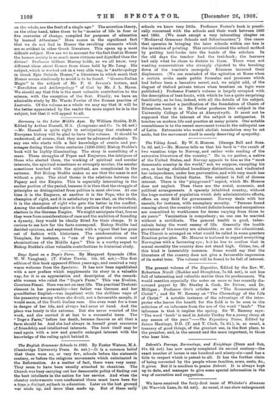The English Grammar Schools to 1660. By Foster Watson, M.A.
(Cambridge University Press. 6s. net.)—It is a common belief that there were no, or very few, schools before the sixteenth century, or before the religious movements which culminated in the Reformation. As a matter of fact, there were very many. They seem to have been usually attached to chantries. The Church was busy carrying out her democratic policy of finding out the best intellects in the nation for her service. And when the chantry endowments were confiscated there must have been for a tinie dist iu,ot sOkgick in palmation. Later on the lost grouna, was made UP, Lind inore' tban made up. But of these ea' schools we know very little. Professor Foster's book is practi- cally concerned with the schools and their work between 1500 and 1660. (We must except a very interesting chapter on "Mediaeval Grammar Schools and Schoolmasters.") One cause that operates in bringing the later schools within our ken is the invention of printing. This revolutionised the school method by putting text-books into the hands of the scholars. In the old days the teacher had the text-book ; the learners had only what he chose to dictate to them. There were not wanting conservatives who strongly objected to the breaking down of the teacher's monopoly. Erasmus incurred their displeasure. (We are reminded of the agitation at Rome when a certain scriba made public formulae and processes which had before been a lucrative secret, and, we might add, of the disgust of Oxford private tutors when treatises on logic were published.) Professor Poster's volume is largely occupied with the description of text-books, with which he has a quite surprising familiarity, as he has, indeed, with all the details of his subject. If any one wanted a justification of the foundation of Chairs of Education, here it is. Mr. Foster professes this subject in the University College of Wales at Aberystwyth. It must not be supposed that the interest of the subject is antiquarian. It tenches on modern life and practice at many points. One notable resemblance is to the recent movement towards the colloquial use of Latin. Extremists who would abolish translation may be set aside, but the movement itself is surely deserving of sympathy.






































 Previous page
Previous page